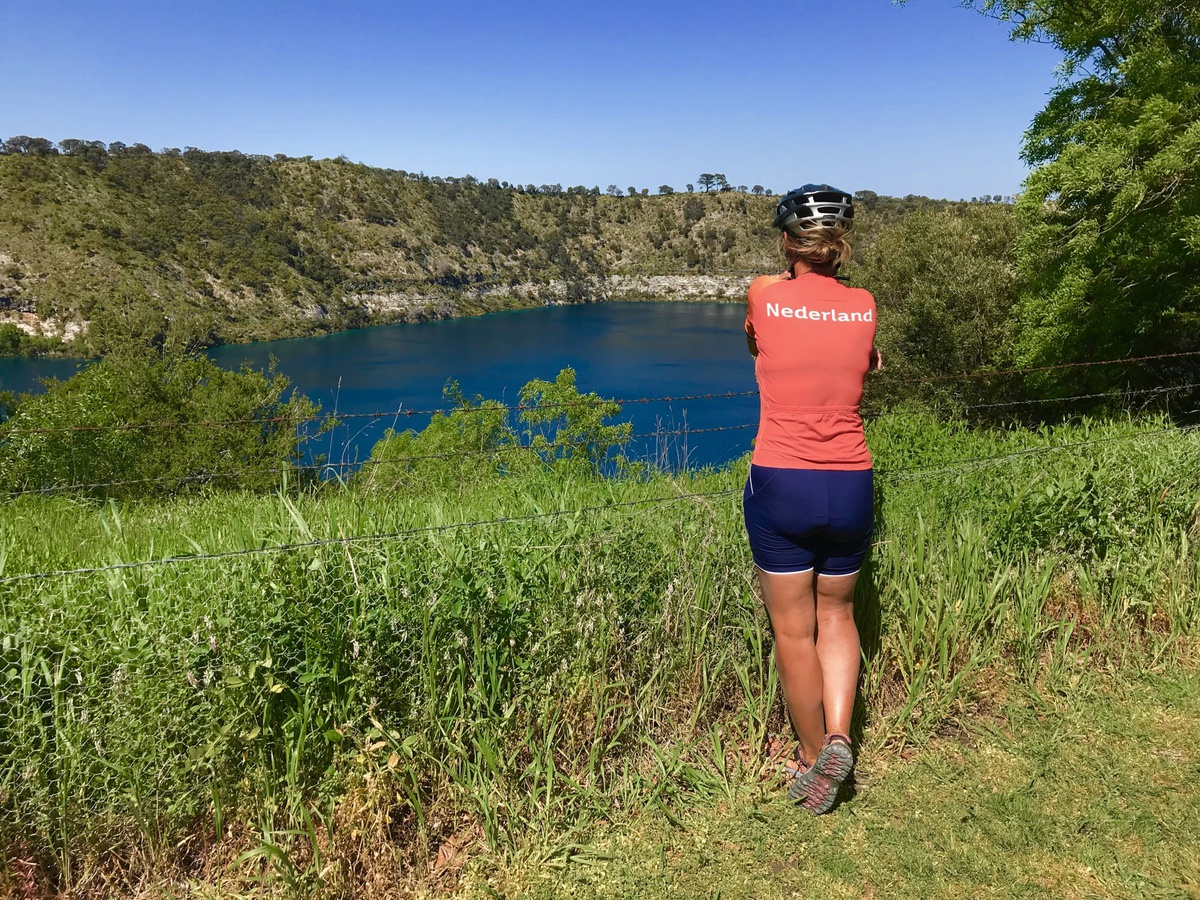Published on October 3, 2019 at 4:42 PM
Published on October 3, 2019 at 4:42 PM
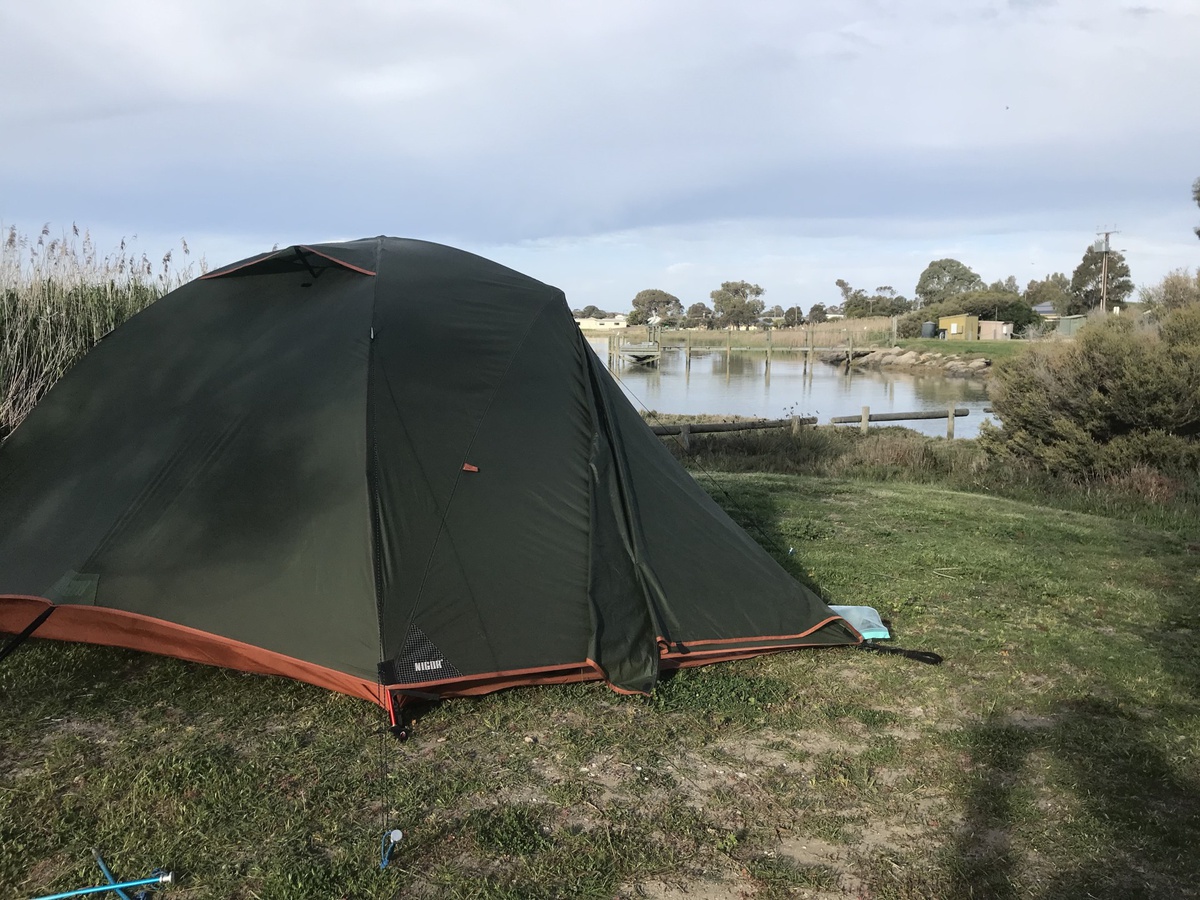
Awesome! We have time left to see another side of Australia. After the red-yellow outback route from Darwin to Perth, the choice was made for the more green-blue cosmopolitan route of Down Under: from Adelaide to Melbourne and Sydney. This blog will be relatively short, because we will only cycle through the southeastern part of South Australia for a few days, roughly from the capital Adelaide to Mount Gambier, 580 kilometers away.
We have found a Warmshowers address in Adelaide, where we can stay for two nights. Our host, Ian, even offers to pick us up at the airport by car, so that we don’t have to assemble our bikes late at night (it is already after eleven when we leave the hall). His car is not big enough for the two bicycle boxes and he drives up and down twice, then tells us goodnight and dives into his bed. It is already after midnight. Normally we fall asleep already but it is here in Adelaide 1.5 hours later than in Perth where we came flying today.
Ian is told in the morning by his boss that he doesn’t have to work today and he can relax and watch how we put the bikes back together. Meanwhile, he talks about his own plans to move to Vientiane, Laos early next year. His girlfriend Geraldine is already there and doing volunteer work there. Ian is an amateur beer brewer and wants to make it his profession in Laos. When the bikes are ready, he takes us on a nice bike ride to the popular Glenelg district on the coast, then along the coast and along a stream back to the city center. We cycle almost the entire route on cycle paths, some of which have been laid on former railway lines. There are more of them in Southeast Australia and we will certainly look for them more often. We see cyclists with tie-wraps protruding from their helmets. Ian says this is against the Magpies, the black and white intelligent, naughty and sometimes annoying bird when it attacks cyclists and taps the helmet while flying.
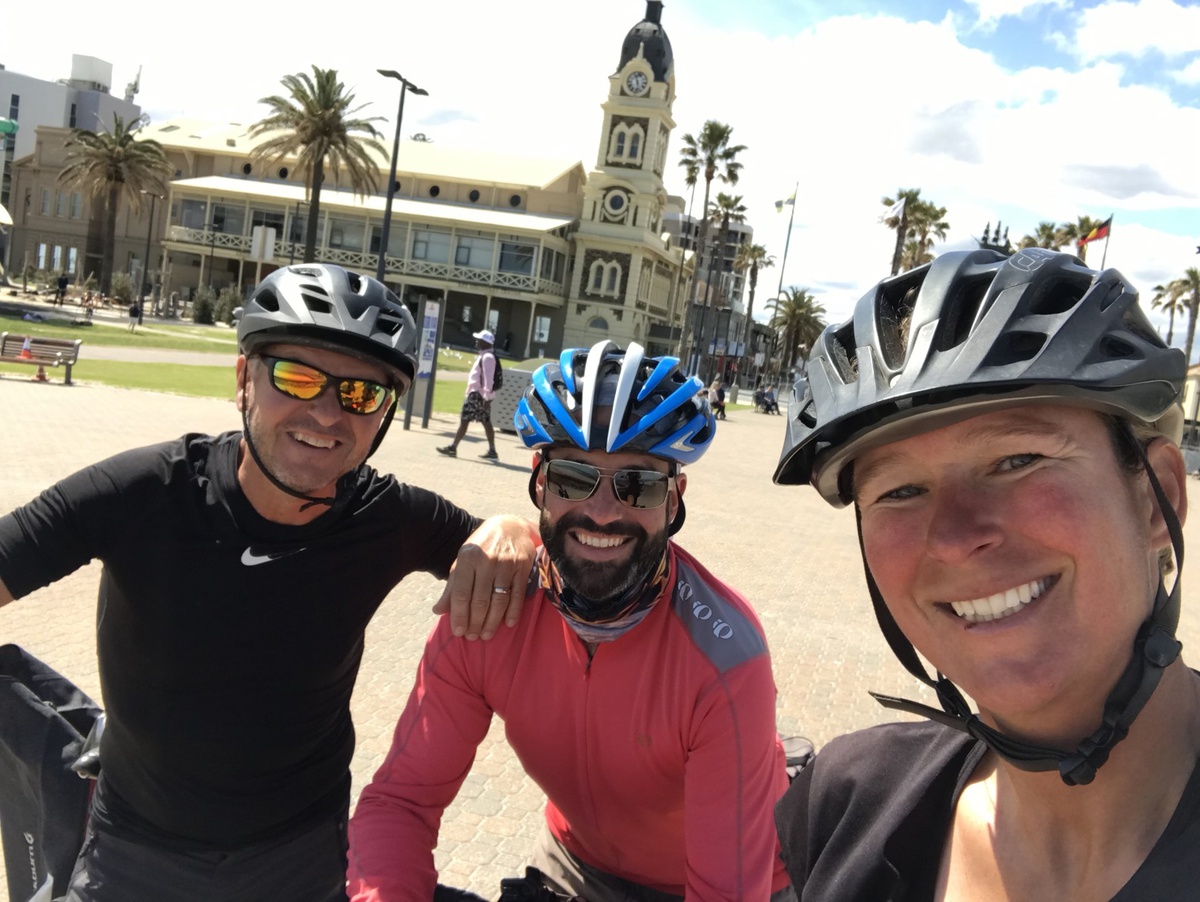
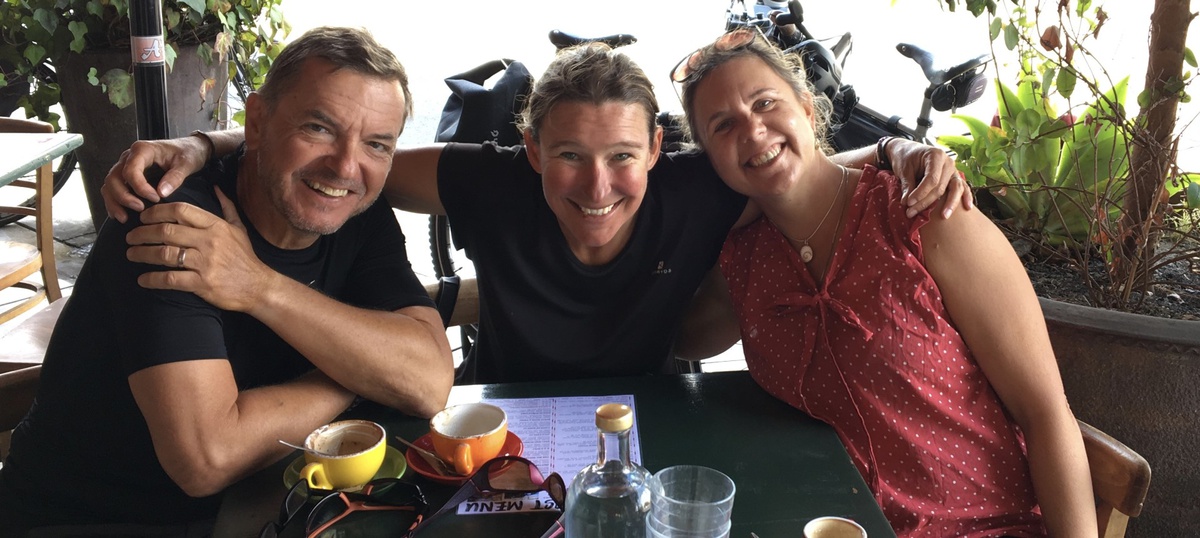
Around lunchtime we have a short meeting with Bec, the infinitely sympathetic lady we met in Kununurra and seen again in Broome. In the meantime, Ian has contact with Ronald, a Dutchman (from Mierlo near Eindhoven) who arrives in Adelaide today and also stays overnight via Warmshowers. Besides his Dutch passport, Ronald also has an Australian passport and will work for six months on Kangaroo Island, south of Adelaide. In the evening we make a dinner for the men and Ian serves his delicious home-made beers. Success guaranteed in Laos!
The next morning it’s time to say goodbye and we are also waved goodbye by Bec and her dog Charlie, who drove to Ian’s house. What follows is one of the most beautiful cycling days in Australia so far: the first 47 km on a excellent cycle path over a former railway line: the Coast to Vines route. Beautiful and amazing views and … we have the wind to our advantage! The route has two pretty tough climbs: a total of 690 meters today, which we have not yet experienced in Australia. At the top of the hills we have a view of the sea and at the end of the route we end up in the MacLaren wine region. Along the way we experience the first “attack” of a Magpie but leave the tie-wraps in the bag. It looks very ridiculous, those helmets with protrusive antennas (“hello houston, hearttobeat here”) and we still have an ego.
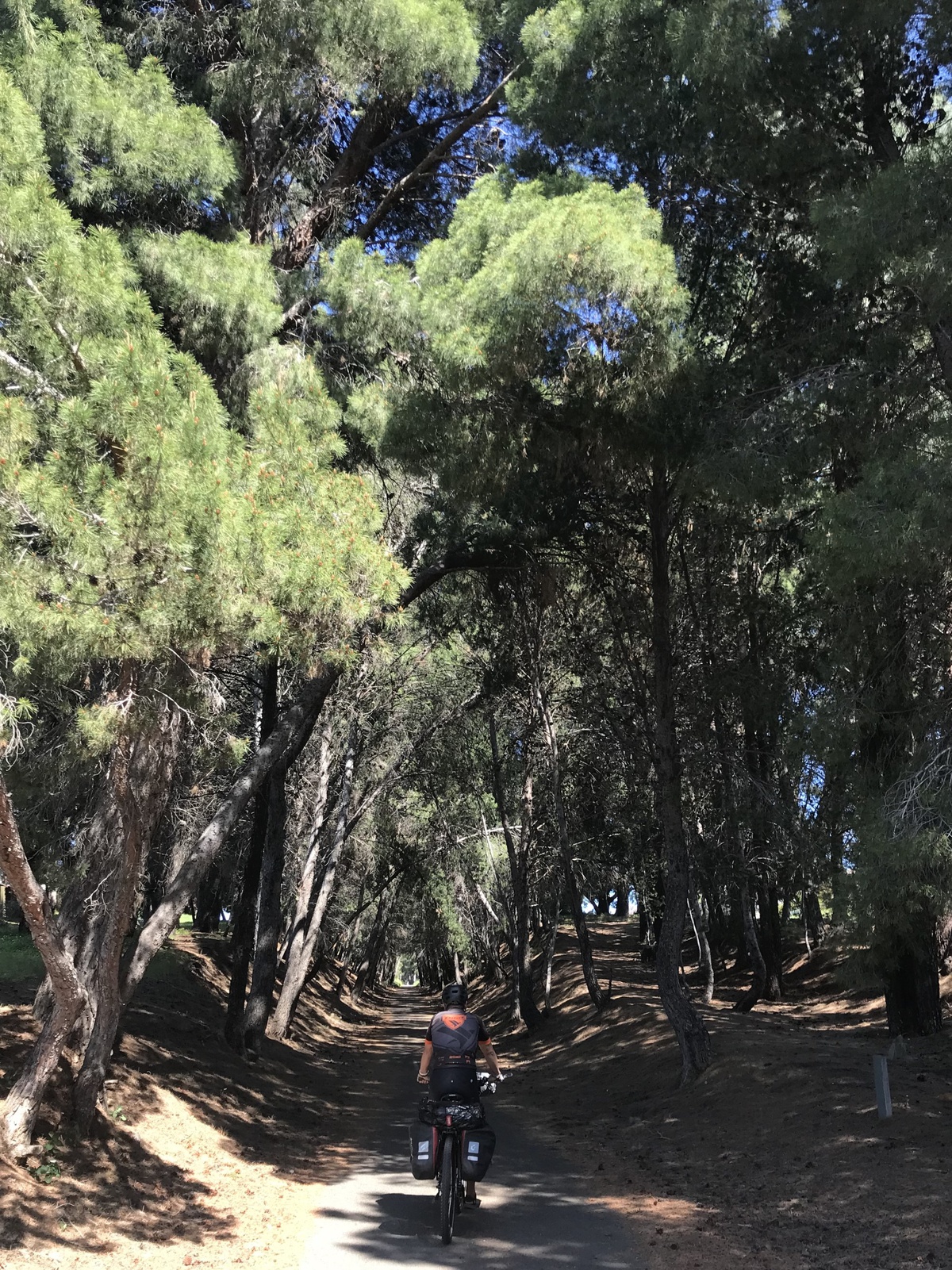
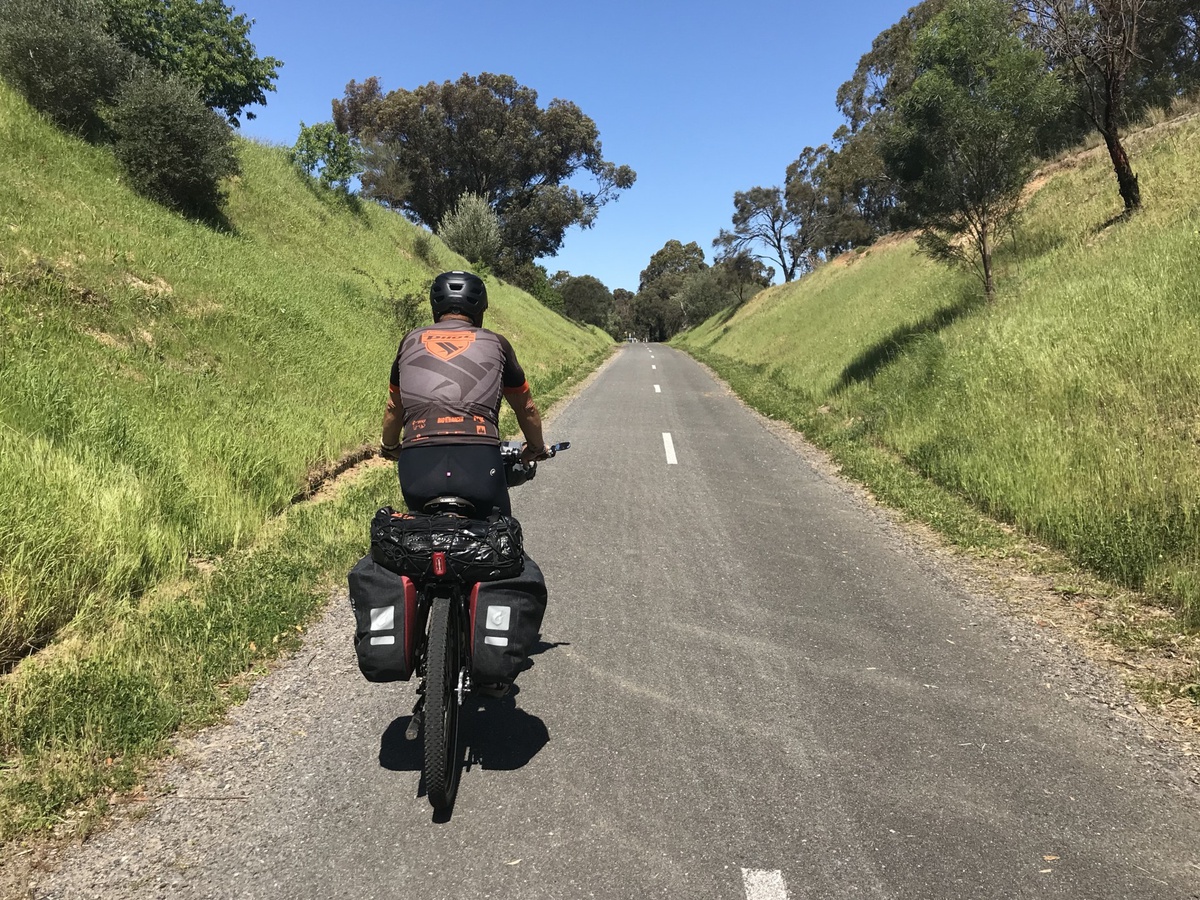
We sleep at the best campsite ever: it starts with a welcome drink, then the hostess brings us towels, bath mats, shampoo, shower gel etc, and there is a great camp kitchen with a pizza oven, free coffee and tea and milk in the fridge. We had already read in the reviews there should be a pizza oven and so we bought pizza already and add fresh ingredients to it. Mount Compass Caravan Park receives 5/5 stars from us.
When we get up in the morning a nice sun is shining already. It promises to be a wonderful day. Sandals on, jackets off, leg warmers and gloves can stay in the bag, toast bread and drink coffee. From the south, however, a thick gray cloud cover appears during this moment of enjoyment and soon spring makes way for fall. The sandals go back into the bag and the jacket goes on again. Along the way we are regularly treated with cold drizzle rain and the temperature keeps falling during the day. Just before that rain, we are on our way to Milang, we meet Jelle and Carla, also from The Netherlands, who are cycling the other way. They landed in Darwin in mid-June and cycled through the middle via Alice Springs to the south. They are now going to Kangeroo Island and hope to spot whales. Their bikes (also made of titanium) and configuration are very similar to ours, their story is very similar to ours, their enthusiasm is very similar to ours. We could chat for hours, but we get cold and unfortunately keep it short, but we virtually follow each other. Who knows somewhere, sometime …
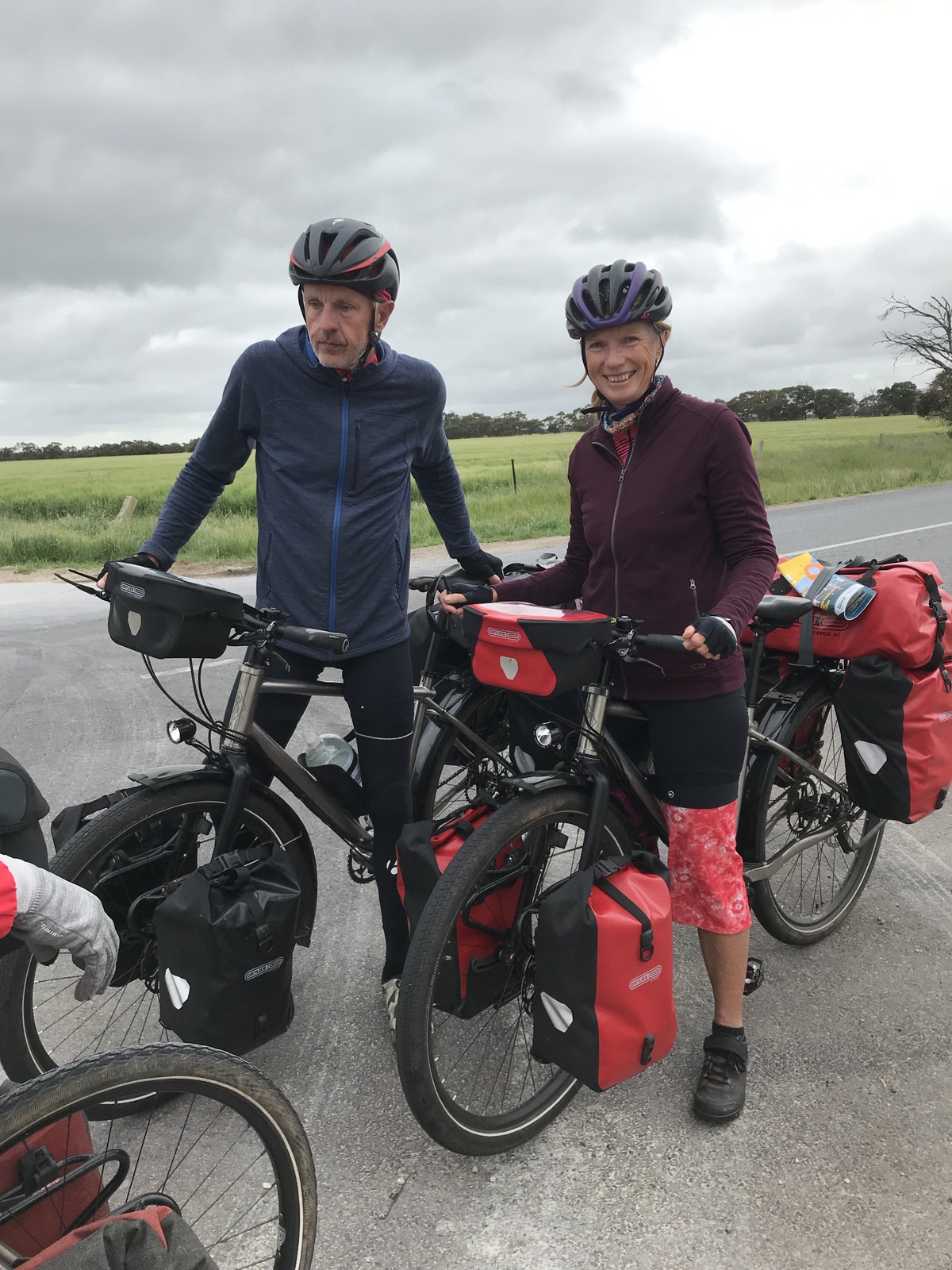
So it’s cold, but the wind blows largely in our favor. In the back of our minds we have the option of cycling a good deal further on such a day as today and pushing on to Lake Albert, but then we still have 50 km of headwind from Wellington. In principle we have plenty of time but it starts to rain and the wind gets stronger and Lake Albert disappears out of our sight. Wellington must still be feasible, it has a caravan park and a hotel, but no other facilities. But that’s okay, because our food bag is nicely filled, right? Or not: suddenly it comes to mind that we have left our food for tonight in the camp kitchen of Mount Compass. Not so handy and we change our plan and go in the same direction as the wind blows to the north to Murray Bridge, which has many large supermarkets so that we can replenish our provisions. At the Aldi we do the shopping with a hungry stomach and (of course) buy way to much food. At the campsite we eat a late lunch with warm soup and baguette. While we pitch the tent, Blue (or we think that is his name) cycles onto the campsite, a guy from Darwin with an Asian appearance, at least we see that when he lifts his ski goggles and pulls his Buff down. He has an excessive amount of luggage with him and also pulls a trailer behind him. He finds the campsite too expensive and only comes to the park to use the toilet. After almost an hour in the toilet, he lingers a little further before letting the pedals go around again. We offered him to share the place but he finally leaves.
Back in the relative warmth of the camp kitchen, we take a look at the upcoming stages to Melbourne. The reason is a message from our friend Hokkie that he will be there on 6 and 7 October. We find out that Melbourne is a bit further away than expected. It is another 10 days of cycling instead of 7. So if we want to see Hokkie, it’ll be a challenge. We also look at the weather forecast: tonight the temperature drops to 1 degree Celcius, brrrr. Because of the late and big lunch we no longer want to cook the intended dinner and shift it to tomorrow night. We limit ourselves to some crackers with Humus and Gouda cheese, imported from The Netherlands, fortunately no clogs on the packaging but a more pleasant stereo typing: a cycling lady amongst tulips.
It is indeed a very cold night and that’s why we wait for the first sun to warm up the tent in the morning. When we continue to cycle we follow the Murray River, although we hardly see it until we arrive at the ferry. Just before we take the ferry, we drink coffee at hotel-pub Wellington with a nice riverside terras.
It is a special day for Australia today: it’s the day of “the finals”. That is not the exam week, not the last round of elections, but the final of “footy”, Australian football league (AFL). The final is between GWS from Sydney, also known as the Giants and Richmond from Melbourne, also known as the Tigers. Two Australian guys already drink a beer on the hotel terras. We start chitchatting and of course talk about (dangerous) animals in Australia. The Aussies warn us of the snakes waking up this time of year, the Magpies swooping and of the drop bears (Koalas falling from the tree), which we will all encounter along the way. The guys are funny and we have a laugh, but we think we should not take it all too seriously.
The route after the ferry is a bit less beautiful and a bit boring. We cycle on the Princess Highway and the weather is so unreliable in this region: first we take off all kinds of clothing and within half an hour, when the wind turns again and the sun sets behind a new cloud cover, they are attracted again. It is the area where you experience three seasons in one day.
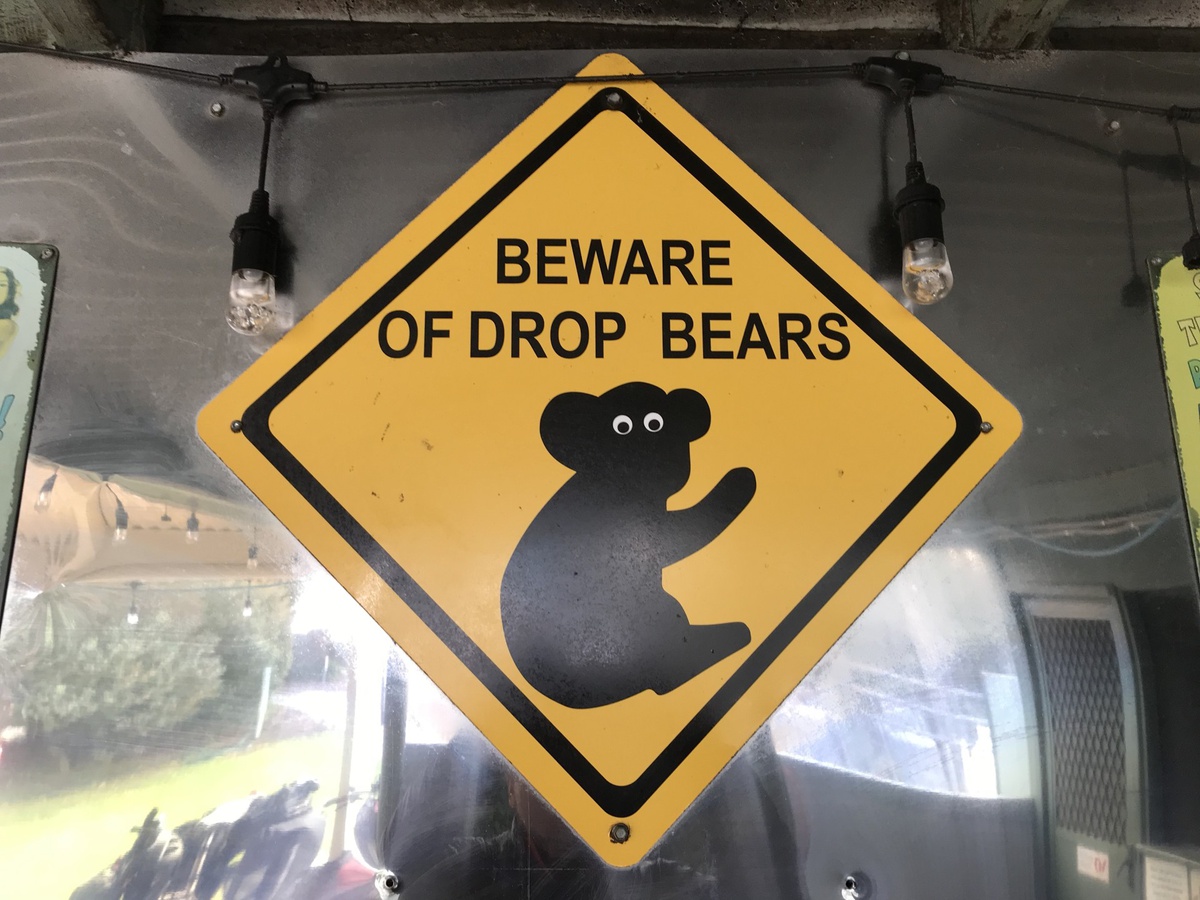
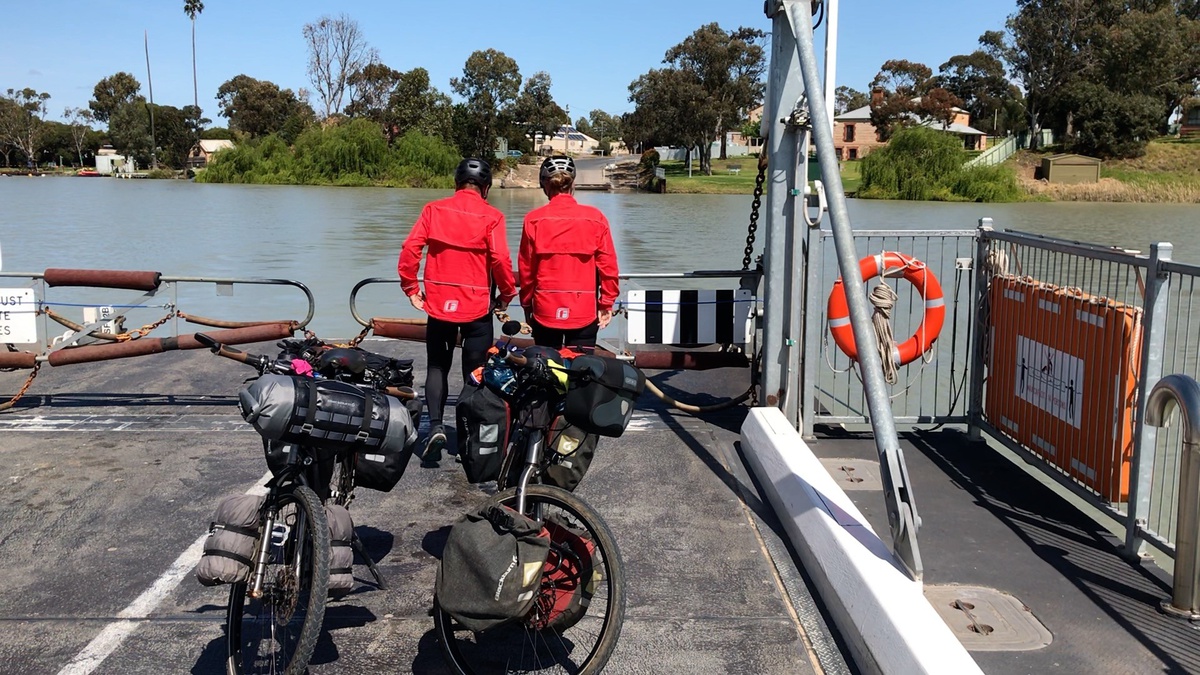
When we arrive at the campsite, the AFL finale between the Tigers and the Giants is on a large screen in the camp kitchen. Not exciting, the Tigers walk over the Giants. Before the end we pitch our tent on the shore of Lake Albert. The view is beautiful: dozens of pelicans are posing in front of us. At night we hear the banjo frog (or the Limnodynastes dumerilii), the frog is also called the pobblebonk after its distinctive “bonk” call, which is likened to a banjo string being plucked.
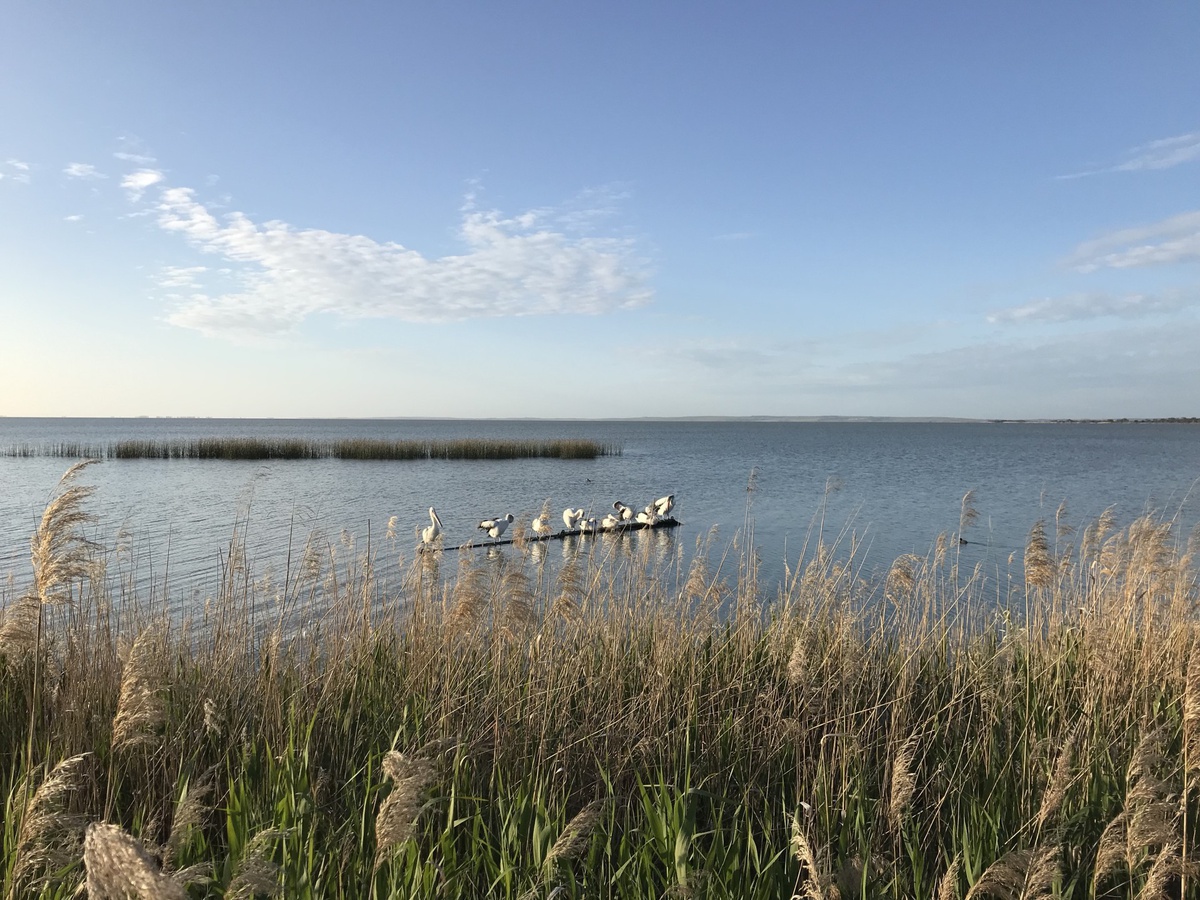
Although the weather forecast indicates that we will have a headwind all day, we are playing with the idea of doing a challenging 150 kilometer stage today. The reason is that we will cycle all day long on the Princess Highway, with only a roadhouse at approximately 60 kilometers, so too close. The highway borders an elongated national park (Coolong) that lies between the highway and the coast in the west. There are several designated camping areas in the national park, but it is still cold today and we do not like the idea that we arrive benumbed and have no possibility of a hot shower and/or the shelter of a camp kitchen. On to Kingston SE then, the next town!
Already after 40 kilometers this beautiful intention starts to falter, because the wind makes it quite difficult for us. The new plan is to tap (or buy) some water at the roadhouse and then camp somewhere in the nature park without a shower, but maybe with a nice campfire. Arriving at the roadhouse we are standing in front of a closed door and the toilets are also boarded up. We hear that the roadhouse has been closed for a few years, while all the signs along the road and the giant sign on top of the roof (“OPEN”), want to convince us of the opposite. We eat (a lot of) sandwiches at a picnic table and also charge ourselves mentally to smash another 90 kilometers into the wind. We only have a little water and that is certainly not enough for a camping night in nature.
As the afternoon progresses, it becomes – just like the previous two days – colder and colder, while the wind picks up even more and in the last twenty kilometers we alternate each kilometer again. With ten kilometers to go, we are again surprised this day by a Magpie who screeches a dive and gives a tap to the helmet, this time Harry’s. We now know that this behavior of the Magpie has to do with the fact that they are quite territorial and there are youngsters somewhere in a nest and that you can do little about this, although shouting back might help. You should never dive with your head, because that would only encourage the Magpie.
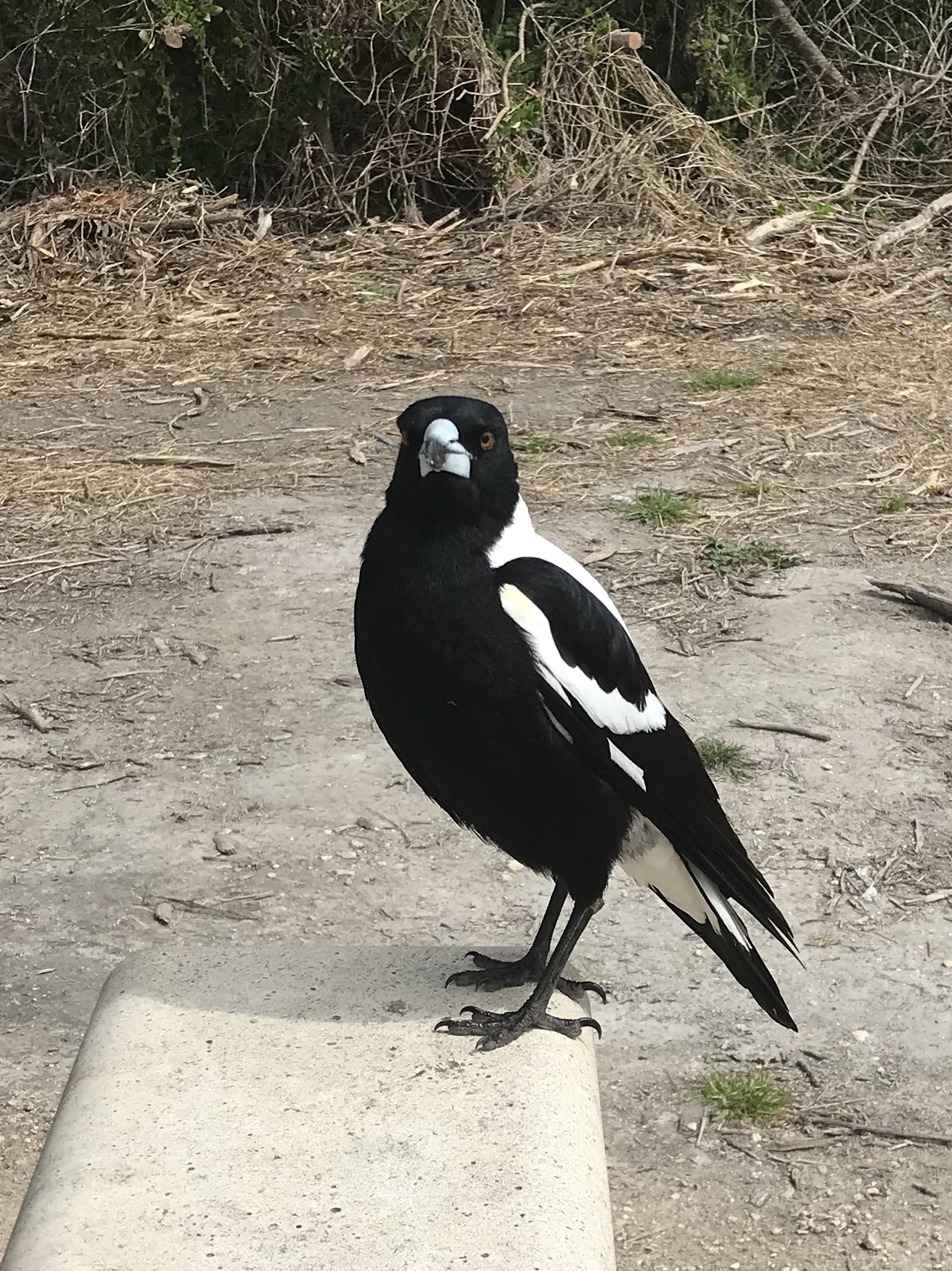
When we arrive at the caravan park in the twilight, it is already closed; it is half past six, half an hour after closing time. There is a house next-door the reception and we both call, Roelie at the back and Harry at the front, over the fence to the residents. Eventually a lady comes out who welcomes us and gives us a quick guide to the park. We can pay tomorrow morning. We cycle on to the camp kitchen, next to which we want to set up our tent. There are already two tents and … two bicycles on that spot. The owners, Ben and Danny, call to us from the kitchen. How nice, cozy chat! But first we pitch the tent in the dark, while we are attacked by mosquitoes from all sides. Is it not too cold for mosquitoes? They simply stab through our cycling shorts, leg warmers and socks, so that we can count the dozens of bumps under the (wonderfully warm) shower. After the shower we join Ben and Danny. They are originally from Melbourne and now live in Brisbane. It is the first time that they do a long bike ride, actually it is the first time that they cycle. The bikes are new and everything that goes with it; great stuff all. They had a hard time on the Nullarbor between Perth and Adelaide because of the extreme headwind, but with their background as ultramarathons runners they are familiar with the mental game. Ben and Danny continue on the highway towards Melbourne and we take the route along the coast. We will probably not see them again.
The next day in the village of Robe, after 50 kilometers headwind, we think it’s enough for today and want to do nothing the rest of the afternoon. We make this decision because of the heavy legs and with the knowledge of another 50 kilometers headwind is too much for today. The weather forecast for tomorrow, indicates that we may have some tailwind! Robe has about five caravan parks, we choose the park that is closest to the coffee shop (a good tip from Ian) where we give ourselves the afternoon off.
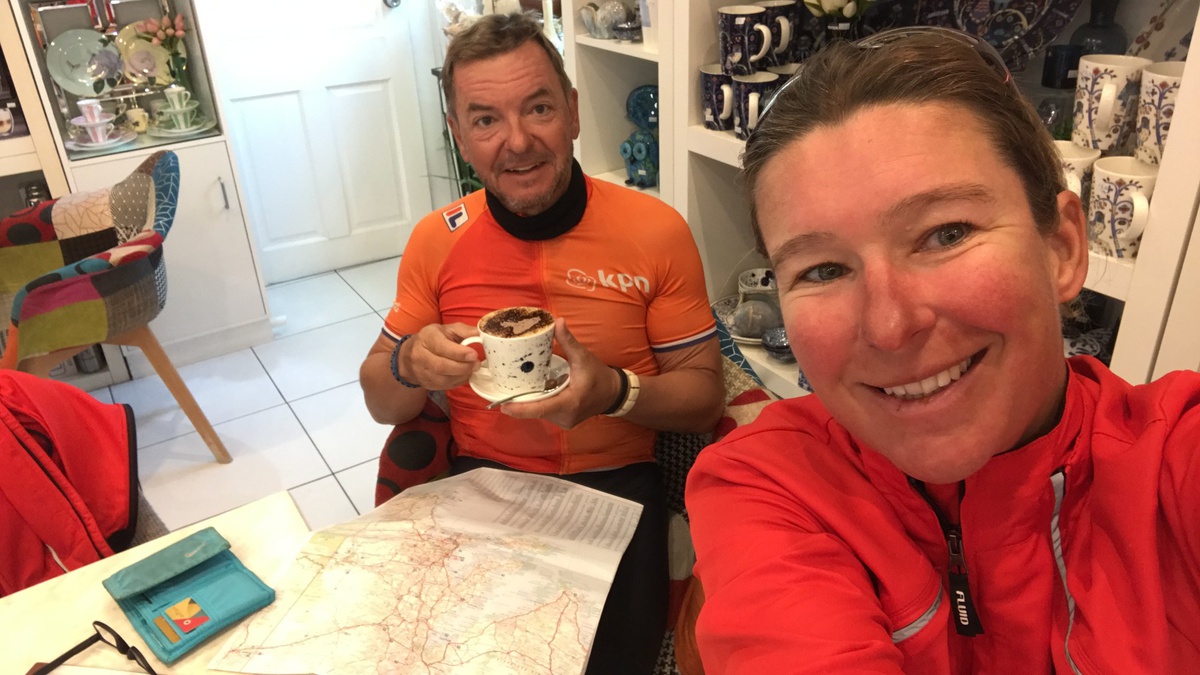
Unfortunately we did not look well at the cost of an overnight stay, because it is quite on the expensive side, but well, the view over the ocean and the limestone coast is majestic. During the night the temperature again approaches the zero degree limit, but it seems that we are getting a bit more used to colder conditions.
The next stage of 134 kilometers to Mount Gambier is very beautiful and the wind is not bothering us today, but unfortunately the promised help from the tail wind in the afternoon is not forthcoming. We cycle through a green hilly landscape with cows and sheep interspersed with gigantic timber plantations.
The traffic signs warn of wildlife: kangaroos, emus, hedgehogs (?) and wombats. In a field we see a large family of kangaroos who flee in fear as we cycle past. The only wombats we see are hit and blown up like a balloon on the side of the road. The next traffic victim is an echidna, a kind of maxi hedgehog or mini porcupine. Moments later we see one safely crossing.
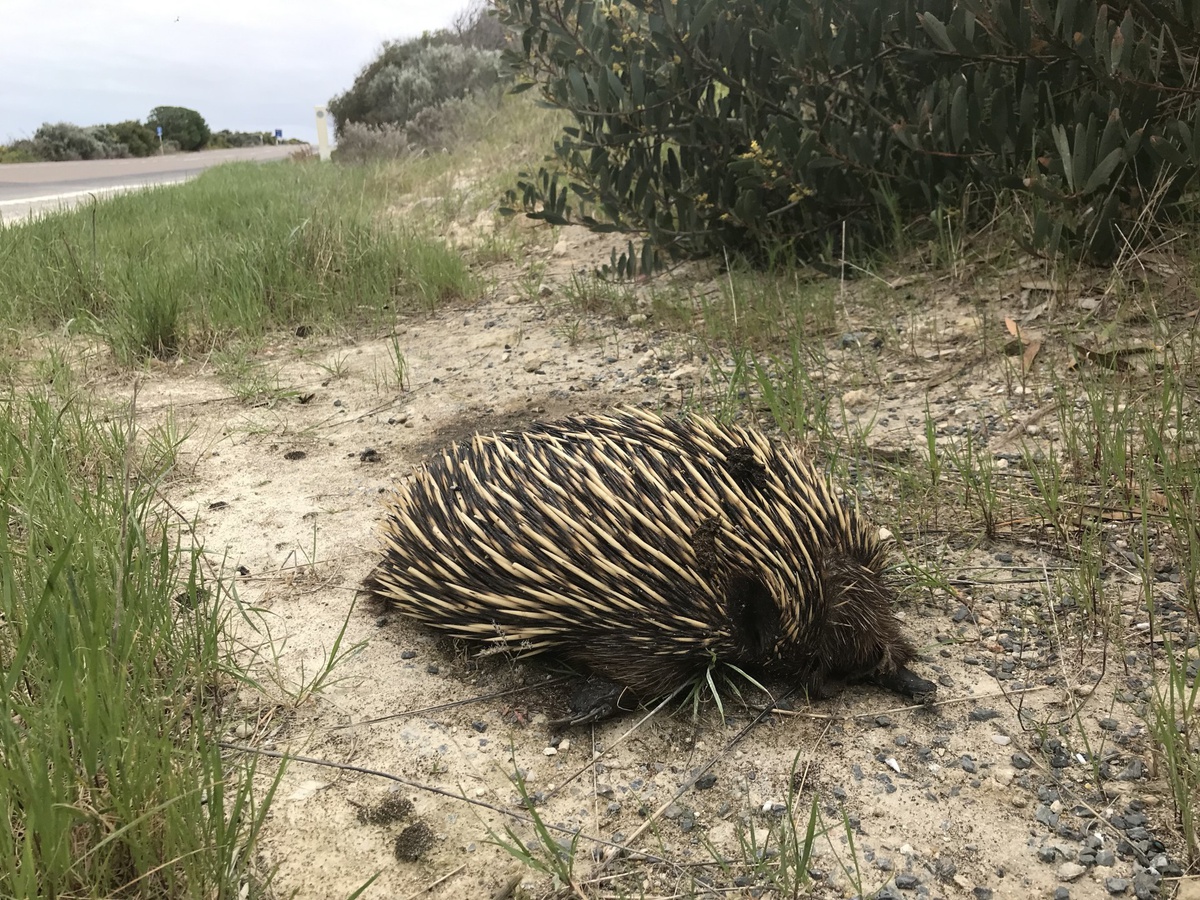
Sporadically we see loads of rabbits hopping around the roadside and sometimes one hit. There is also a dead big hare amongst the roadkill. We see a dead snake but we are not completely sure if it is dead. We keep a safe distance and take a picture while Harry throws small stones to check if it is dead or alive. We later ask what kind of snake it is and it is probably a tiger snake and they are quite poisonous. An earlier photo of a fat spider appears to be a totally harmless huntsman. A crossing dog in the middle of nowhere looks a lot like a dingo, but we don’t think that they occur in this part of Australia. It might be a vox or a wolf. Nevertheless, it reminds us to be careful for the critters. The daily attacks of the magpies on our heads / helmets are increasing, but of course we also learn. We start to see the signs of a possible attack and it helps that we almost always have the sun in our backs, so that we can see the shadow of a Magpie on the asphalt in front of us. In nine out of ten attacks, a timely, angry scream and an arm raised (according to Harry, “a middle finger” helps better) make the magpie break off his dive.
With just 20 kilometers to go to Mount Gambier, we see two cyclists in front of us. We catch up with them during a climb and that we meet and chat at the top. Harry introduces herself and the lady of the couple tells her name: Marita. Huh, Marita? Have we not met before, in Vientiane, Laos ??? Hell yes! It becomes even better when they choose the same campsite and we chat more extensively with Marita, Roberto and son Dante. Their journey started in Oxford, UK and ends in Melbourne. They are almost at the end of the trip, well, they call it a pauze. They will stay for about two years in Melbourne. Marita is of Australian origin and she and Roberto, of Italian origin, are owners of a house in Melbourne that they return to after 18 years.
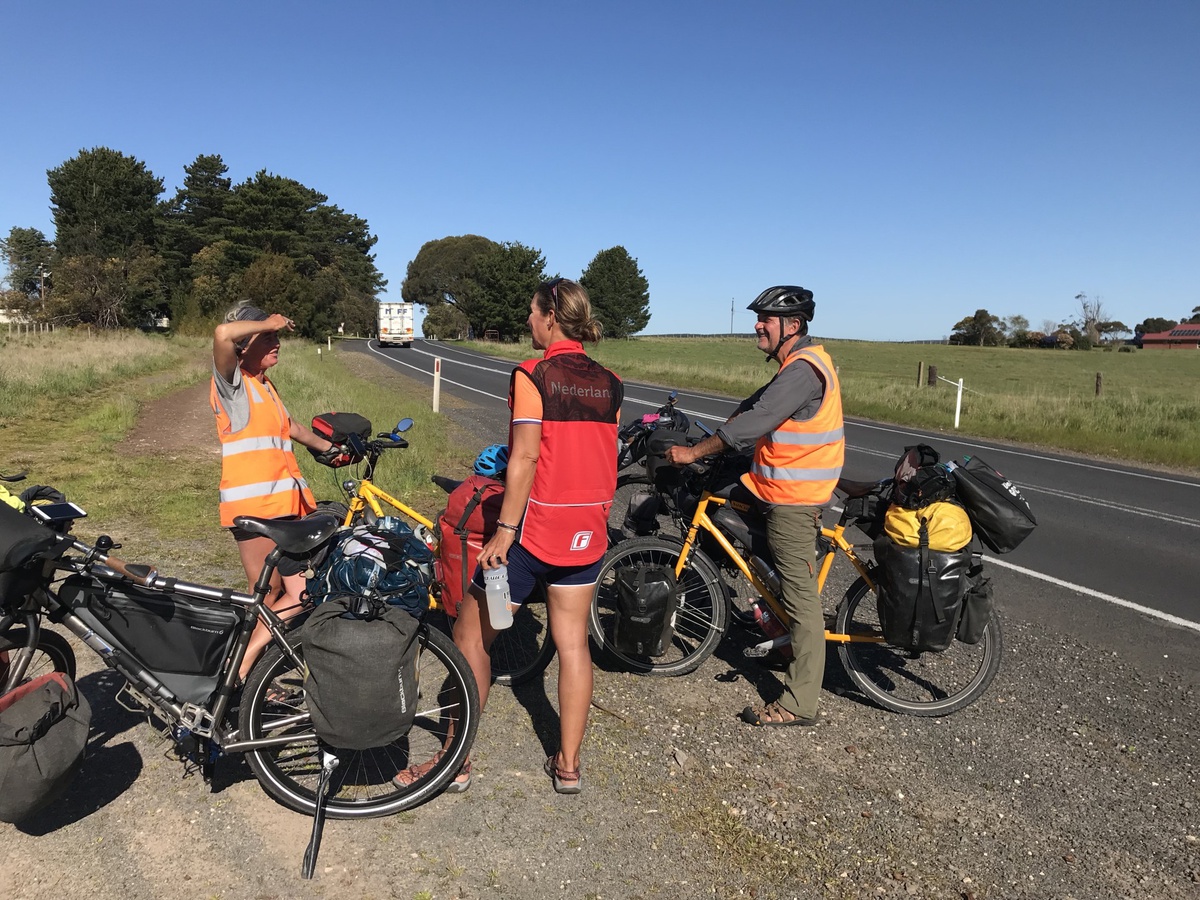
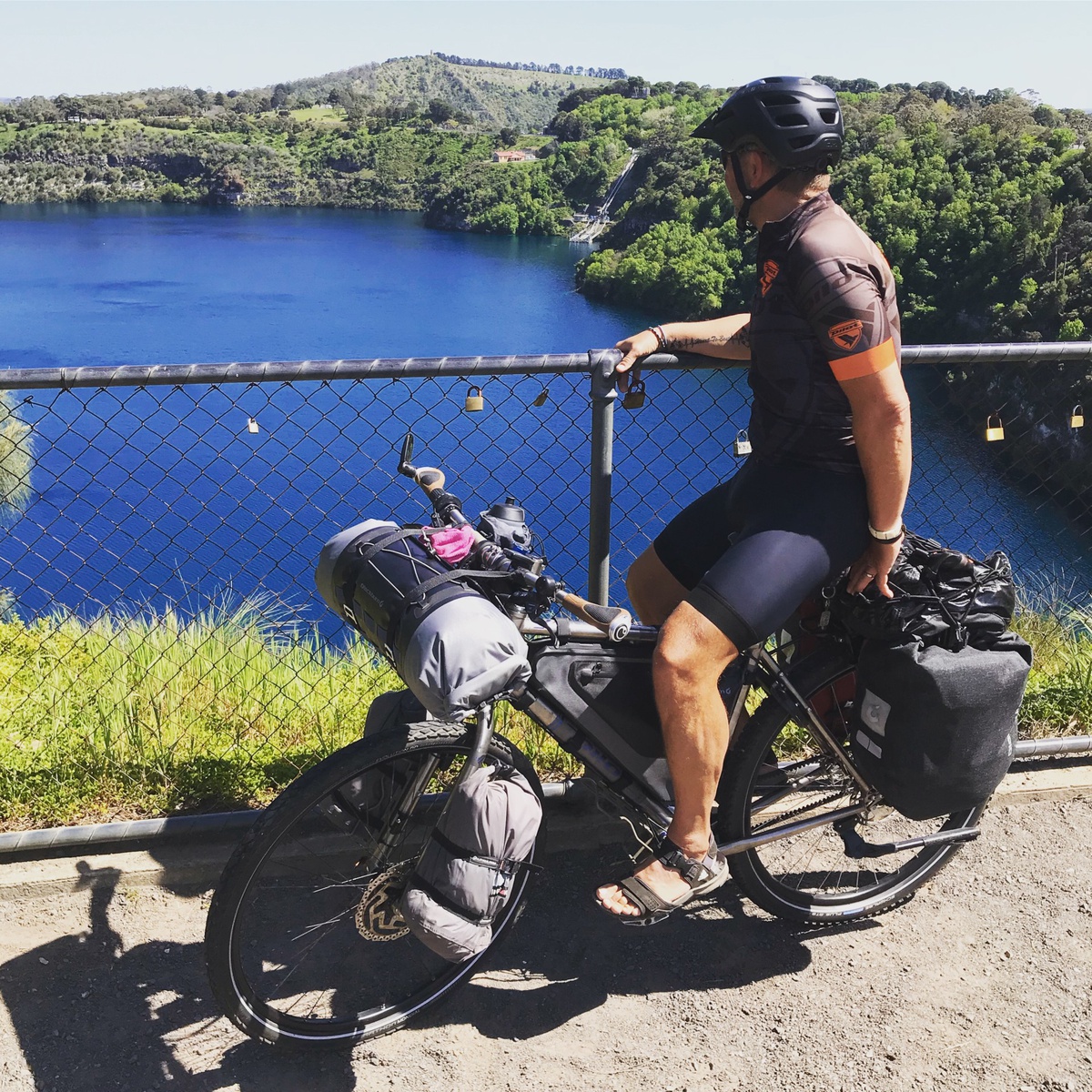
The next morning we sleep in until half past eight and the rain has stopped. Although there is quite a big stage planned, we take it easy and we chat in the camp kitchen with Roberto. Only at half past ten the feet are back on the pedals. Then the wind has turned and a wonderful sunny day awaits us. We first visit the Blue Lake in the largest crater of the volcanic area on which Mount Gambier is settled. The water is incredibly blue and is the umpteenth gift from mother nature to the coastal region of South Australia. Two days ago we saw pink lakes at Coorong NP, yesterday green lakes south of Robe and today a clear blue one. Two hours later we leave South Australia and enter Victoria under a clear blue sky.
South Australia is large and versatile. We have only seen a very small part and only the extremely green water-rich part. We cycled through this section for exactly seven days and we still have to get used to the fact that the scenery of emptiness and drought on Darwin-to-Perth has changed in to the lush green landscape of Adelaide-to-Sydney.
